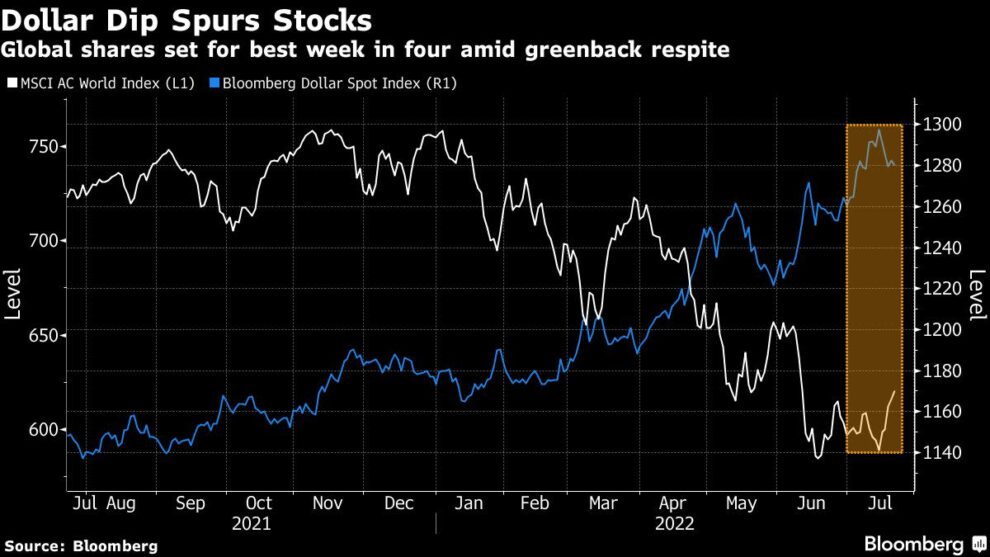
(Bloomberg) — US stocks swung between gains and losses as investors parsed a flood of big-name second-quarter earnings. Treasuries extended gains after weak US economic data.
Most Read from Bloomberg
The S&P 500 pared losses in choppy trade. American Express Co. led financial stocks higher after reporting record revenue and raising full-year forecasts. Snap Inc.’s poor results weighed on social-media stocks, and Twitter Inc. slipped after posting disappointing second-quarter sales. The tech-heavy Nasdaq 100 underperformed, falling 0.5%.
Snap’s disappointing revenue hit stocks, including Facebook parent Meta Platforms Inc. and Google owner Alphabet Inc. Hardware and storage companies including Micron Technology Inc. and Western Digital Corp. fell after Seagate Technology Plc’s earnings miss and weak outlook.
Despite Friday’s churn, the equity market remains on course for their best week in a month, paring this year’s market rout to about 16%. Speculation that the worst of the selloff has passed is partly behind the move. Angst about the damage from inflation and rapidly rising interest rates is proving hard to shake — despite a tempering in expectations of just how aggressive the Federal Reserve will be.
“It’s still very early days but we’ve seen numerous cases now of earnings surprises driven by the ‘it’s not as bad as we feared’ argument,” said Craig Erlam, a senior market analyst at Oanda. “That’s a relief of course, but surely not a case for a sustainable rebound.”
In other earnings news:
Friday’s losses for Snap mark the second major sector selloff sparked by Snap in two months, as its results become a barometer for ad spending amid mounting economic fears. There are growing signs that tech companies are preparing for a recession with some pulling back on hiring, while Meta has lost about half of its value this year after disappointing revenue forecasts.
Read more: Company Forecasts Are Showing Inflation Cracks: Earnings Watch
Underscoring recession fears, Treasuries extended an advance, pushing the 10-year yield to around 2.7%. US business activity contracted in July for the first time in more than two years, according to the S&P Global flash composite purchasing managers output index.
That prompted swaps traders to pare bets on Fed hikes, shifting toward pricing a 50-basis-point hike in September as more likely than a three-quarter-point hike. Swaps targeting next week’s meeting briefly indicated below 75 basis- point was slightly less than certain.
Meanwhile, German short-term bonds soared as investors trimmed bets on European Central Bank rate hikes after weaker-than-expected PMI data in the region fanned fears of a recession.
Some of the main moves in markets:
Stocks
-
The S&P 500 was little changed as of 10:30 a.m. New York time
-
The Nasdaq 100 fell 0.5%
-
The Dow Jones Industrial Average rose 0.2%
-
The Stoxx Europe 600 rose 0.4%
-
The MSCI World index rose 0.1%
Currencies
-
The Bloomberg Dollar Spot Index fell 0.4%
-
The euro was little changed at $1.0229
-
The British pound rose 0.2% to $1.2024
-
The Japanese yen rose 0.9% to 136.17 per dollar
Bonds
-
The yield on 10-year Treasuries declined seven basis points to 2.81%
-
Germany’s 10-year yield declined 17 basis points to 1.05%
-
Britain’s 10-year yield declined nine basis points to 1.96%
Commodities
-
West Texas Intermediate crude was little changed
-
Gold futures rose 1.2% to $1,752.10 an ounce
Most Read from Bloomberg Businessweek
©2022 Bloomberg L.P.












